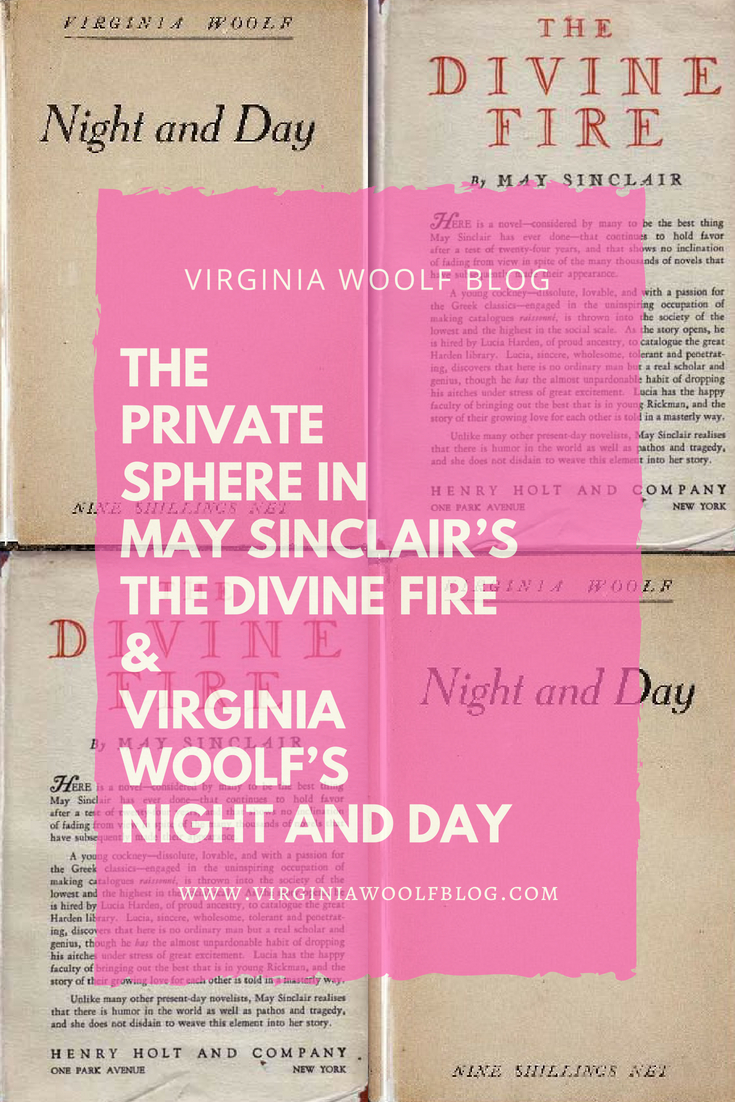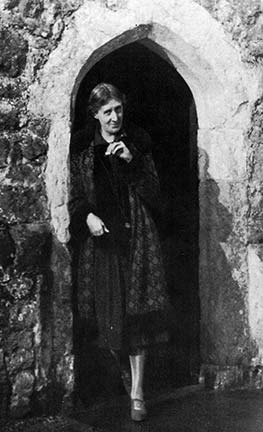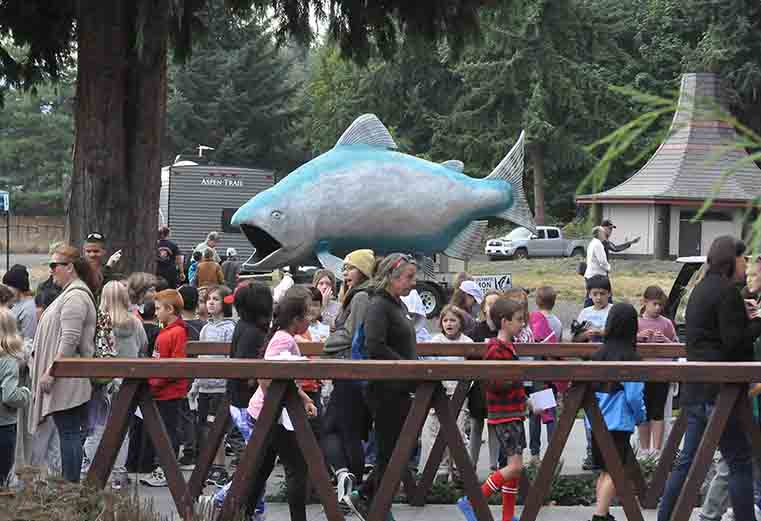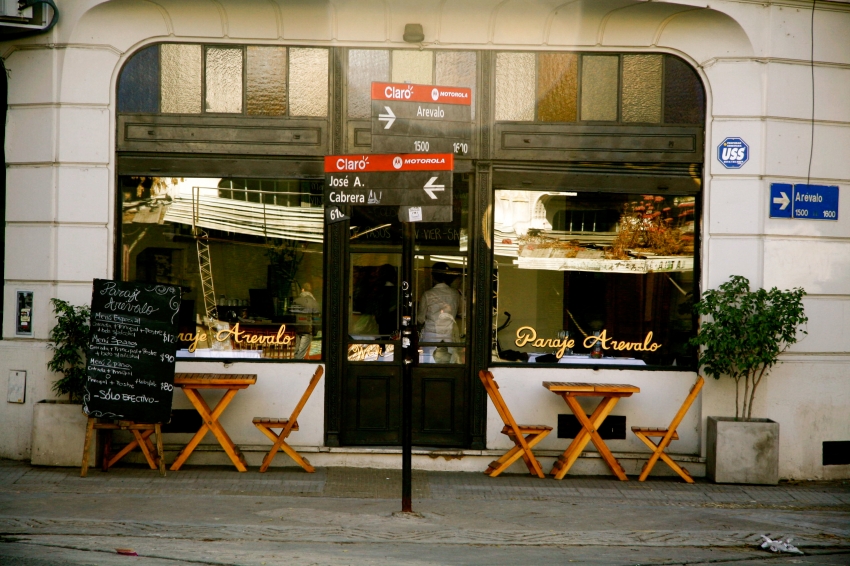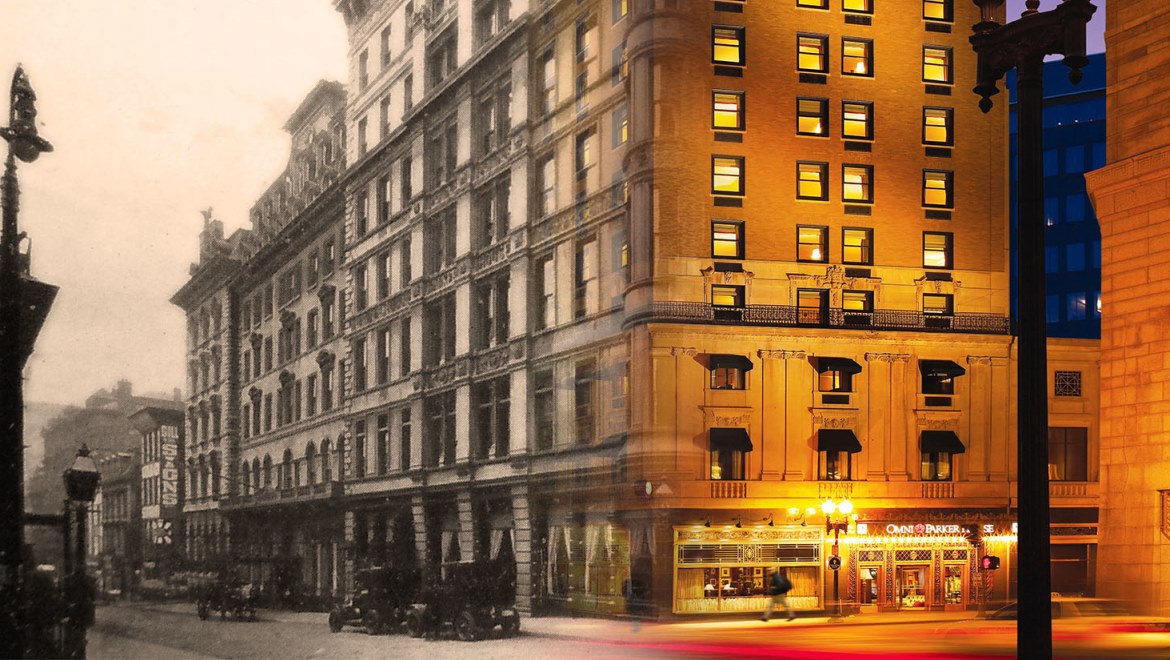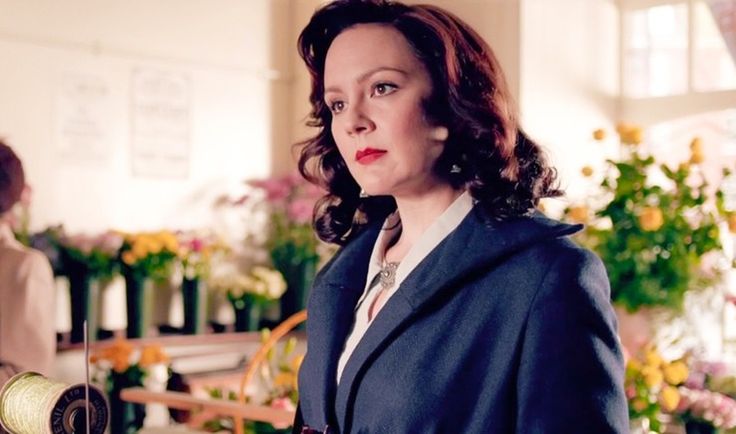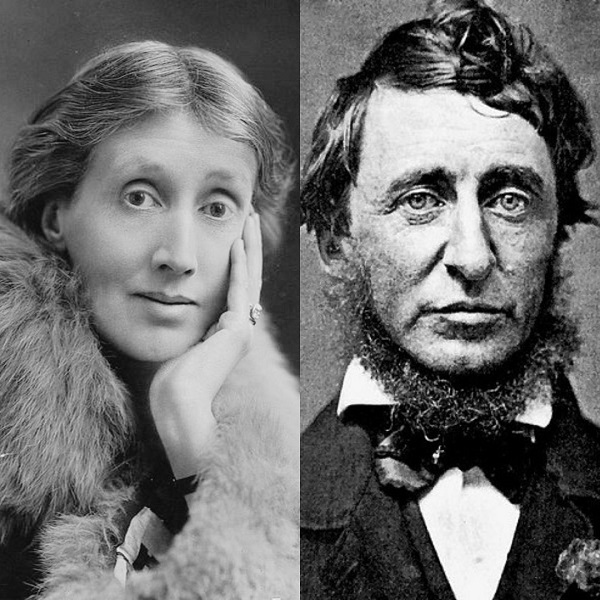
In July of 1917, Virginia Woolf wrote an article commemorating the 100th anniversary of Henry David Thoreau’s birth for the Times Literary Supplement.
Woolf was an admirer of American writers like Thoreau and felt American writers were more inventive and adventurous than any British writer to date.
What is interesting about this essay is that, despite Woolf’s exclusively upper class British upbringing, she understood Thoreau better than most modern-day American readers and even more so than some of his own peers, such as Woolf’s American godfather and Thoreau’s rival James Russell Lowell.
Woolf saw Thoreau not as a misanthropic hermit trying to hide from society in the woods, but as a “noble” rebel attempting to teach his fellow man his unique philosophy on life through his writing and actions.
It was as if she saw him as she saw herself, a misfit trying to invent a new way of life, much like she and her fellow Bloomsbury group members were attempting to do in 20th century London.
In recent years, many literary critics have even drawn comparisons between the Bloomsbury group and the Concord transcendentalist writers, which include Thoreau, Hawthorne, Emerson and Alcott, nicknaming them the “American Bloomsbury.”
Woolf seems to have picked up on these similarities well before anyone else did and instead of distancing herself from her American counterparts, fully embraced them.
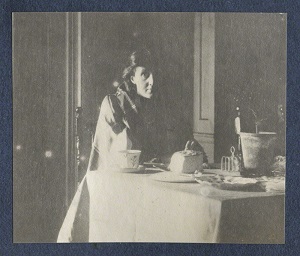
Woolf’s essay on Thoreau, despite the fact that it was published nearly a century ago, remains to this day one of the most insightful, thoughtful and intelligent tributes to this all too often misunderstood man.
Here is the essay in its entirety as it was originally published in the Times Literary Supplement on July 12, 1917:
Thoreau by Virginia Woolf
A hundred years ago today, on 12 July, 1817, was born Henry David Thoreau, the son of a pencil-maker in Concord, Massachusetts. He has been lucky in his biographers, who have been attracted to him not by his fame so much as by their sympathy with his views, but they have not been able to tell us a great deal about him that we shall not find in the books themselves. His life was not eventful; he had, as he says, ‘a real genius for staying at home’. His mother was quick and voluble, and so fond of solitary ramblings that one of her children narrowly escaped coming into the world in an open field. The father, on the other hand, was a ‘small, quiet, plodding man’, with a faculty for making the best lead pencils in America, thanks to a secret of his own for mixing levigated plumbago with fuller’s earth and water, rolling it into sheets, cutting it into strips, and burning it. He could at any rate afford with much economy and a little help to send his son to Harvard, although Thoreau himself did not attach much importance to this expensive opportunity. It is at Harvard, however, that he first becomes visible to us. A class-mate saw much in him as a boy that we recongise later in the grown man, so that instead of a portrait we will quote what was visible about the year 1837 to the penetrating eye of the Rev. John Weiss:
‘He was cold and unimpressible. The touch of his hand was most and indifferent, as if he had taken up something when he saw your hand coming, and caught your grasp on it. How the prominent grey-blue eyes seemed to rove down the path, just in advance of his feet, as his grave Indian stride carried him down to University Hall. He did not care for people; his class-mates seemed very remote. This reverie hung always about him, and not so loosely as the odd garments which the pious household care furnished. Thought had not yet awakened his countenance; it was serene, but rather dull, rather plodding. The lips were not yet firm; there was almost a look of smug satisfaction lurking round their corners. It is plain now that he was preparing to hold his future views with great setness and personal appreciation of their importance. The nose was prominent, but its curve fell forward without firmness over the upper lip, and we remember him as looking very much like some Egyptian sculpture of faces, large-featured, but brooding, immobile, fixed in a mystic egoism. Yet his eyes were sometimes searching, as if he had dropped, or expected to find, something. In fact his eyes seldom left the ground, even in his most earnest conversations with you…’
He goes on to speak of the ‘reserve and inaptness’ of Thoreau’s life at college. Clearly, the young man thus depicted, whose physical pleasures took the form of walking and camping out, who smoked nothing but ‘dried lily stems’, who venerated Indian relics as much as Greek classics, who in early youth had formed the habit of ‘settling accounts’ with his own mind in a diary, where his thoughts, feelings, studies, and experiences had daily to be passed under review by that Egyptian face and searching eye – clearly this young man was destined to disappoint both parents and teachers and all who wished him to cut a figure in the world and become a person of importance. His first attempts to earn his living in the ordinary way by becoming a schoolmaster was brought to an end by the necessity of flogging his pupils. He proposed to talk morals to them instead. When the committee pointed out that the school would suffer from the ‘undue leniency’ Thoreau solemnly beat six pupils and then resigned, saying that school-keeping ‘interfered with his arrangements’. The arrangements that the penniless young man wished to carry out were probably assignments with certain pine trees, pools, wild animals, and Indian arrowheads in the neighbourhood, which had already laid their commands upon him.
But for a time he was to live in the world of men, at least in that very remarkable section of the world of which Emerson was the centre and which professed the Transcendentalist doctrines. Thoreau took up his lodgings in Emerson’s house and very soon became, so his friends said, almost indistinguishable from the prophet himself. If you listened to them both talking with your eyes shut you could not be certain where Emerson left off and Thoreau began ‘…in his manners, in the tones of his voice, in his modes of expressions, even in the hesitations and pauses of his speech, he had become the counterpart of Mr. Emerson.’ This may well have been so. The strongest natures, when they are influenced, submit the most unreservedly; it is perhaps a sign of their strength. But that Thoreau lost any of his own force in the process, or took on permanently any colours not natural to himself the readers of his books will certainly deny.
The Transcendentalist movement, like most movements of vigour, represented the effort of one or two remarkable people to shake off the old clothes which had become uncomfortable to them and fit themselves more closely to what now appeared to them to be the realities. The desire for readjustment had, as Lowell has recorded and the memoirs of Margaret Fuller bear witness, its ridiculous symptoms and its grotesque disciples. But of all the men and women who lived in an age when thought was remoulded in common, we feel that Thoreau was the one who had least to adapt himself, who was by nature most in harmony with the new spirit. He was by birth among those people, as Emerson expresses it, who have ‘silently given in their several adherence to a new hope, and in all companies do signify a greater trust in the nature and resources of man than the laws of the popular opinion will well allow’. There were two ways of life which seemed to the leaders of the movement to give scope for the attainment of these new hopes; one in some cooperative community, such as Brook Farm; the other in solitude with nature. When the time came to make his choice Thoreau decided emphatically in favour of the second. ‘As for the communities,’ he wrote in his journal, ‘I think I had rather keep bachelor’s quarters in hell than go to board in heaven.’ Whatever the theory might be, there was deep in his nature ‘a singular yearning to all wildness’ which would have led him to some such experiment as that recorded in Walden, whether it seemed good to others or not. In truth he was to put in practice the doctrines of the Transcendentalists more thoroughly than any one of them, and to prove what the resources of man are by putting his entire trust in them. Thus, having reached the age of twenty-seven, he chose a piece of land in a wood on the brink of the clear deep green waters of Walden pond, built a hut with his own hands, reluctantly borrowing an axe for some part of the work, and settled down, as he puts it, ‘to front only the essential facts of life, and see if I could not learn what it had to teach, and not, when I came to die, discover that I had not lived.’
And now we have a chance of getting to know Thoreau as few people are known, even by their friends. Few people, it is safe to say, take such an interest in themselves as Thoreau took in himself; for if we are gifted with an intense egoism we do our best to suffocate it in order to live on decent terms with our neighbours. We are not sufficiently sure of ourselves to break completely with the established order. This was Thoreau’s adventure; his books are the record of that experiment and its results. He did everything he could to intensify his own understanding of himself, to foster whatever was peculiar, to isolate himself from contact with any force that might interfere with his immensely valuable gift of personality. It was his sacred duty, not to himself alone but to the world; and a man is scarcely an egoist who is an egoist on so grand a scale, a sense of beholding life through a very powerful magnifying glass. To walk, to eat, to cut up logs, to read a little, to watch the bird on the bough, to cook one’s dinner – all these occupations when scraped clean and felt afresh prove wonderfully large and bright. The common things are so strange, the usual sensations so astonishing that to confuse or waste them by living with the herd and adopting habits that suit the greater number is a sin – an act of sacrilege. What has civilisation to give, how can luxury improve upon these simple facts? ‘Simplicity, simplicity, simplicity!’ is his cry. ‘Instead of three meals a day, if it be necessary eat but one; instead of a hundred dishes, five; and reduce other things in proportion.’
But the reader may ask, what is the value of simplicity? Is Thoreau’s simplicity simplicity for its own sake, and not rather a method of intensification, a way of setting free the delicate and complicated machinery of the soul, so that its results are the revere of simple? The most remarkable men tend to discard luxury because they find that it hampers the play of what is much more valuable to them. Thoreau himself was an extremely complex human being, and he certainly did not achieve simplicity by living for two years in a hut and cooking his own dinner. His achievement was rather to lay bare what was within him – to let life take its own way unfettered by artificial constraints. ‘I do not wish to live what was not life, living is so dear; nor did I wish to practise recognition, unless it was quite necessary, I wanted to live deep and suck out all the marrow of life…’ Walden – all his books, indeed – are packed with subtle, conflicting, and very fruitful discoveries. They are not written to prove something in the end. They are written as the Indians turn down twigs to mark their path through the forest. He cuts his way through life as if no one had ever taken that road before, leaving these signs for those who come after, should they care to see which way he went. But he did not wish to leave ruts behind him, and to follow is not an easy process. We can never lull our attention asleep in reading Thoreau by the certainty that we have now grasped his theme and can trust our guide to be consistent. We must always be ready to try something fresh; we must always be prepared for the shock of facing one of those thoughts in the original which we have known all our lives in reproductions. ‘All health and success does me good, however far off and withdrawn it may appear; all disease and failure helps to make me sad and do me evil, however much sympathy it may have with me or I with it.’ ‘Distrust all enterprises that require new clothes.’ ‘You must have a genius for charity as well as for anything else.’ That is a handful, plucked almost at random, and of course there are plenty of wholesome platitudes.
As he walked his woods, or sat for hours almost motionless like the sphinx of college days upon a rock watching the birds, Thoreau defined his own position to the world not only with unflinching honesty, but with a glow of rapture at his heart. He seems to hug his own happiness. Those years were full of revelations – so independent of other men did he find himself, so perfectly equipped by nature not only to keep himself housed, fed, and clothed, but also superbly entertained without any help from society. Society suffered a good many blows from his hand. He sets down his complaints so squarely that we cannot help suspecting that society might one of these days have to come to terms with so noble a rebel. He did not want churches or armies, post offices or newspapers, and very consistently he refused to pay his tithes and went into prison rather than pay his poll tax. All getting together in crowds for doing good or procuring pleasure was an intolerable infliction upon him. Philanthropy was one of the sacrifices, he said, that he had made to a sense of duty. Politics seemed to him ‘unreal, incredible, insignificant,’ and most revolutions not so important as the drying up of a river or the death of a pine. He wanted only to be left alone tramping woods in his suit of Vermont grey, unhampered even by those two pieces of limestone which lay upon his desk until they proved guilty of collecting the dust, and were at once thrown out of the window.
And yet this egoist was the man who sheltered runaway slaves in his hut; this hermit was the first man to speak out in public in defence of John Brown; this self-centered solitary could neither sleep nor think when Brown lay in prison. The truth is that anyone who reflects as much and as deeply as Thoreau reflected about life and conduct is possessed of an abnormal sense of responsibility to his kind, whether he chooses to live in a wood or to become president of the Republic. Thirty volumes of diaries which he would condense from time to time with infinite care into little books prove, moreover, that the independent man who professed to care so little for his fellows was possessed with an intense desire to communication with them. ‘I would fain,’ he writes, ‘communicate the wealth of my life to men, would really give them what is most precious in my gift…I have no private good unless it be my peculiar ability to serve the public…I wish to communicate those parts of my life which I would gladly live again.’ No one can read him and remain unaware of this wish. And yet it is a question whether he ever succeeded in imparting his wealth, in sharing his life. When we have read his strong and noble books, in which every word is sincere, every sentence wrought as well as the writer knows how, we are left with a strange feeling of distance; here is a man who is trying to communicate but who cannot do it. His eyes are on the ground or perhaps on the horizon. He is never speaking directly to us; he is speaking partly to himself and partly to something mystic beyond our sight. ‘Says I to myself,’ he writes, ‘should be the motto to my journal,’ and all his books are journals. Other men and women were wonderful and very beautiful, but they were distant; they were different; he found it very hard to understand their ways. They were as ‘curious to him as if they had been prairie dogs’. All human intercourse was indefinitely difficult; the distance between one friend and another was unfathomable; human relationships were very precarious and terribly apt to end in disappointment. But, although concerned and willing to do what he could short of lowering his ideals, Thoreau was aware that the difficulty was one that could not be overcome by taking pains. He was made differently from other people. ‘If a man does not keep pace with his companions, perhaps it is because he hears a different drummer. Let him step to the music which he hears, however measured or far away.’ He was a wild man, and he would never submit to be a tame one. And for us here lies his peculiar charm. He hears a different drummer. He is a man into whom nature has breathed other instincts than ours, to whom she has whispered, one may guess, some of her secrets.
‘It appears to be a law,’ he says, ‘that you cannot have a deep sympathy with both man and nature. Those qualities which bring you near to the one estrange you from the other.’ Perhaps that is true. The greatest passion of his life was his passion for nature. It was more than a passion, indeed; it was an affinity; and in this he differs from men like White and Jefferies. He was gifted, we are told, with an extraordinary keenness of the senses; he could see and hear what other men could not; his touch was so delicate that he could pick up a dozen pencils accurately from a box holding a bushel; he could find his way alone through thick woods at night. He could lift a fish out of the stream with his hands; he could charm a wild squirrel to nestle in his coat; he could sit so still that the animals went on with their play around him. He knew the look of the country so intimately that if he had waked in a meadow he could have told the time of year within a day or two from the flowers at his feet. Nature had made it easy for him to pick up a living without effort. He was so skilled with his hands that by labouring forty days he could live at leisure for the rest of the year. We scarcely know whether to call him the last of an older race of men, or the first of one that is to come. He had the toughness, the stoicism, the unspoilt senses of an Indian, combined with the self-consciousness, the exacting discontent, the susceptibility of the most modern. At times he seems to reach beyond our human powers in what he perceives upon the horizon of humanity. No philanthropist ever hoped more of mankind, or set higher and nobler tasks before him, and those whose ideal of passion and of service is the loftiest are those who have the greatest capacities for giving, although life may not ask of them all that they can give, and forces them to hold in reserve rather than to lavish. However much Thoreau had been able to do, he would still have seen possibilities beyond; he would always have remained, in one sense, unsatisfied. That is one of the reasons why he is able to be the companion of a younger generation.
He died when he was in the full tide of life, and he had to endure long illness within doors. But from nature he had learnt both silence and stoicism. He had never spoken of the things that had moved him most in his private fortunes. But from nature, too, he had learnt to be content, not thoughtlessly or selfishly content, and certainly not with resignation, but with a healthy trust in the wisdom of nature, and in nature, as he says, there is no sadness. ‘I am enjoying existence as much as ever,’ he wrote from his deathbed, ‘and regret nothing’. He was talking to himself of moose and Indian when, without a struggle, he died.
An annotated Kindle edition of Walden that includes this essay can be purchased here:
Sources:
The Essays of Virginia Woolf, Vol 2: 1912-1918; Virginia Woolf

